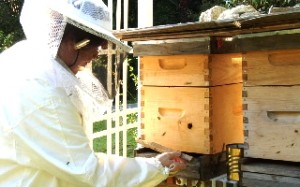Beekeeping can be a hobby, a sideline operation or a full-time vocation. Together, hobbyists and part-timers account for about 50 percent of bee colonies and about 40 percent of honey produced. Millions around the world practice beekeeping as a hobby, a hobby that provides a sweet bonus each year: healthy, sweet, delicious honey. Join us to learn about Honeybees in an information packed 2 hour Introduction Group or a Day Long Workshop. Look at the events listings page for an upcoming class and below a registration paypal button.
You could be well on your way to harvesting your own honey!
Honey consumption is huge just in the U.S. alone, add that to the consumption in the rest of the world an you have a big demand.
So how does that relate to production? According to the national Honey Board : “The U.S. has a market for about 400 million pounds of honey, and for the last couple of years nearly half of that has come from foreign sources, mainly Argentina and China.”
From 1980-2002, U.S. honey production had averaged around 200 million pounds per year. In 2008, 161 million pounds of honey were produced in the United States…
So you can see there is a deficit of production to consumption in the US. Production has decreased also with severe losses to the honeybee colonies in the past few years as a result of colony collapse disorder, stress on bees, toxic chemicals, etc. Responsible Backyard Beekeeping can help save the honeybees. Beekeeping and honey production can also be a successful business. It can be a healthy way of making money while enjoying the honey with your family and friends.
The Benefits of Beekeeping…
Beekeeping is an activity that anyone can do because it requires very little or no land. Young or old, male or female, anyone can participate! It takes very little time and effort to care for bees. Unlike dairy cows, for instance, that require much daily care, honeybees take care of themselves for the most part. (besides, just the thought of 30 to 50 thousand cows flying around overhead is a scary notion)
Beekeeping requires less outlay of money than most hobbies or other businesses. The equipment consists of beehives, bee suits and some simple tools. It will also likely consist of ordering packaged bees and queen. Beekeeping basics are also fairly easy to learn.
Bees are great pollinators. The cost and availability of our foods are significantly reduced because of bees. They are extremely important to our economy. Large scale beekeepers are hired by big farms to increase their food production through targeted pollination!
Other sources of sweeteners/sugars often cause erosion and damage to the world’s forests because the sources are planted crops such as beet root and cane. Honey is also very stable and very transportable. Honey, that has been allowed to be properly dried and cured by the hive and capped off can last years and years in the right conditions. It doesn’t have to be rushed to market like some other products to keep from spoiling.
So, not only do bee products have a long shelf life and are a valuable food source, the other bee products such as: wax and pollen and propolis can also be consumed as food, dietary supplements or used as medicine, salves, candles and more.
Bee stings are also used as a healing modality. Apitherapy is the selective use of bee venom to cause a response to the body’s autoimmune system. This may bring a relief of symptoms and pain for some with chronic illness and may bring a cure for others. Caution, however to those who are allergic.
Whether you want to start a business as a beekeeper or just want to observe and learn from this fascinating member of the natural world- right in your own backyard, it is important to have the correct information needed to start this hobby. This will prevent you from making some costly mistakes and “take the sting out of it” ouch…



